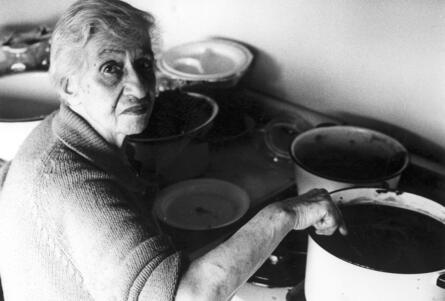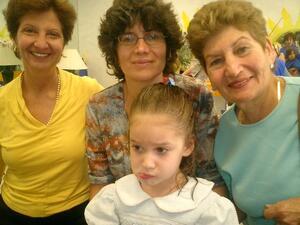Dianne Cohler-Esses
This photo and the accompanying article represent the span of culture and history I navigated in order to become the first female rabbi, as well as the only non-Orthodox rabbi from the Syrian Jewish community.
Very few people leave the tightly-knit world of the Syrian Jewish community in Brooklyn and when they do, they often leave the way of life behind, including any kind of religious practice. When I left my community, I also left all forms of Jewish life. But, ultimately, I reclaimed a Jewish way of life on my own terms – terms that would allow me, as a woman, to have a voice.
I encountered the feminist movement in my later high school years. It offered alternatives to getting married and having children at the age of 19, the only model I had grown up with. The notion that a woman could become a rabbi didn't enter my mind until I was in college. The American feminist movement, and ultimately Jewish feminism, gave me the strength and imagination to leave the Syrian community and create a new life.
However, in my journey through the Jewish Ashkenazic world and the Jewish feminist world, I often felt my own history eclipsed. Non-Western Jewish history and culture were largely invisible at the Conservative seminary I attended, as well as in the consciousness of most Ashkenazic Jews. Moreover, being a feminist made it difficult for me to bring the lives of generations of Syrian Jewish women – lives that consisted of creating, maintaining, and sustaining families as well as weaving familial and communal webs – into my own life and world. I believed I needed to reject those women and all they represented in order to become who I was: a woman who went to college, a single working woman living outside of the confines of the community, a rabbi, and a feminist.
This photograph was featured in an exhibition I worked on in the mid-1980s on Syrian Jewish immigration to this country. Taken by Judith Helfand, it features a woman stirring a pot in her kitchen. That is all: a Syrian Jewish immigrant woman stirring a simple pot in a simple kitchen in the heart of the community in Flatbush, Brooklyn. The second artifact is an article I wrote during my first year at the Seminary about entering rabbinical school and the reactions of my parents, their friends, and a rabbi in the community. The distance from that pot to my own world is vast. Not easily and not often crossed. Jewish feminism provided the bridge from one shore to the other. Now my work is to stir.
Dianne Cohler-Esses is the first woman from the Syrian Jewish community in Brooklyn to become a rabbi, ordained by the Jewish Theological Seminary (JTS) in 1995. She currently serves as Scholar In Residence at UJA Federation in New York. After graduating, she received a year-long fellowship to study with Rabbi Yitz Greenberg and to teach and design curriculum at CLAL, the Center for Leadership and Learning. Subsequently she did advanced academic work in Midrash at the Jewish Theological Seminary and served as educational director for Mishpacha, an online education and support program for alienated Jewish families across America. She was director of a feminist retreat for Ma’yan: The Jewish Women’s Project of the JCC in Manhattan and on the faculty for the Hebrew Union College Kollel, the JTS Hevrutah program, The Skirball Institute and the Bronfman Youth Fellowship. From 1998 until 2002, she was the co-director of the Bronfman Youth Fellowship and subsequently served as their senior educator until the summer of 2005. She lives with her husband – a journalist – and their children in New York City.





